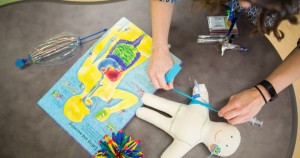We love celebrating, don’t you?
Let’s celebrate March, because it’s Child Life Month! Child life specialists are professionals who are specially trained in children’s development and work to support the positive coping of patients and families during stressful life events they may face such as illness, injury, hospitalization, loss and bereavement.
To celebrate Child Life Month, Upopolis’ child life team wanted to share some of their favourite child life tips and tricks with you – whether you’ve been in the profession for 2 or 22 years, are a parent who has a child or youth with a medical illness, or a parent who simply visits the doctor with their child once a year, we’re sure you’ll find these quick tips helpful!
Krista, National Program Manager: Know your local community resources and supports for patients and families. Inpatient stays are now fairly short and clinic visits are quick; make sure you know about, and share, community resources, programs and virtual options to provide your patients with ongoing support and options that fit their needs.
Melissa, Grief Island Lead: Try to provide children and youth with a sense of control when you can. Medical encounters typically leave them feeling helpless; knocking on their door, introducing yourself and asking permission to enter the room gives them back a sense of control over their environment and supports their control of autonomy. This goes for parents, too!
Nancy, Grief Island Lead: Keep it simple when it comes to rapport building tools. Markers, blank paper and a small bin of figurines are small but mighty tools that can be used to build rapport and introduce therapeutic activities with patients. The figurines may also serve as a transitional object for in-between visits. The child can borrow a special toy and use it as a touchstone to remind them of the skills learned in the therapeutic activity. The child may also exchange figurines at each appointment, building that rapport between yourself and the patient.
Tija, Sibling Island Lead and Social Media Coordinator: When having difficult conversations with youth, such as conversations about death and dying, bring along a small item that can act as a “fidget” toy. It may seem juvenile for a teen, but playdough or a squishy ball helps to keep their hands busy during a difficult conversation; you’d be surprised how quickly they engage with them to fill those awkward silences.
Jes, Program Coordinator: Try and build rapport with the child or youth right from the first meeting with them. Scan the room for anything that can connect you to them; look at their outfit, backpack, comfort item… anything that you can use to make a connection. Finding those connections can help to enable conversation and therapeutic rapport which will help you reach the them in that moment.
Sophia, Intern: Give children and youth the information they are seeking, and be truthful about what is going to happen. Children and youth cope well when they have all the appropriate information presented to them in a developmentally appropriate language. Rather than ‘hiding’ information from them because it feels like too much, word it in a way that is simple enough for them to understand.
Jordan, Program Support: Learning a new skill under stress is incredibly difficult, especially coping skills. Spend time exploring and practice coping skills with children and youth when there is no imminent stressor. Identify and practice a favourite breathing technique, establish a relaxing visualization routine, or even dabble in some meditation. Building mastery and confidence in these areas during times of calm helps children and youth pull upon them with success during times of stress.
Happy Child Life Month to all the wonderful child life specialists out there, from our team to yours! For more information on how our child life team operates on Upopolis, check out our past blog: https://www.upopolis.com/2021/03/the-role-of-child-life-online-what-does-a-child-life-specialist-do-on-upopolis/
Photo credit to Hamilton Health Sciences.







